SWEDISH
SOUTH ASIAN STUDIES NETWORK
Newsletter 67:
 9
November
2006
9
November
2006
| SASNET News | Educational News |
| Research Community News | |
| Conferences and workshops | Important lectures and seminars |
| Cultural activities | New items on the web site |
• Decision about new Board of SASNET
On Thursday
9 November 2006, Lund University Vice-Chancellor Göran Bexell
decided the new composition of SASNET’s board for the period
1 January 2007 to 31 December 2009.
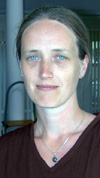 The
board will be chaired by Associate Professor
Gunnel Cederlöf (photo to the right), Dept.
of History, Uppsala University. The
other members of the board will be:
The
board will be chaired by Associate Professor
Gunnel Cederlöf (photo to the right), Dept.
of History, Uppsala University. The
other members of the board will be:
Representatives for Lund University: Dr.
Pernille Gooch, Division of Human Ecology,
Dept. of European Ethnology; Associate Professor Catarina Kinnvall, Dept.
of Political Science; and Assistant Professor Jan Magnusson,
School of Social Work (and Centre for
East and South-East Asian Studies, ACE). Deputy members:
Prof. Staffan Lindberg, Dept. of Sociology;
and PhD candidate Kristina Myrvold, Dept.
of History and Anthropology of Religion, Centre for Theology
and Religious Studies.
Representatives for other Swedish Universities
and Colleges:
Associate Professor Prosun Bhattacharya, Dept.
of Land and Water Resources Engineering, Royal Institute of Technology
(KTH), Stockholm; and Associate Professor Cecilia Stålsby-Lundborg, Division
of International Health (IHCAR), Dept. of Public Health Sciences,
Karolinska Institutet Medical University, Stockholm. Deputy members:
Dr. Per Hilding, Dept. of Economic History,
Stockholm University: and Dr. Camilla Orjuela, Division
of Peace and Development Research (PADRIGU), School of Global Studies,
Göteborg University.
Representative for doctoral candidates: PhD candidate Ferdinando Sardella, Dept.
of Religious Studies and Theology, Göteborg University.
Deputy member: PhD candidate Wimal Pathmasiri, Dept.
of Bioorganic Chemistry (previously Division
of Pharmacognosy, Dept. of Medicinal Chemistry), Uppsala University.
Representative for other Nordic universities: Dr.
Neil Webster, Institute
for International Studies (DIIS), Copenhagen, Denmark. Deputy
member: Dr. Arild Engelsen-Ruud, Dept.
of Culture Studies and Oriental Languages (IKOS), University
of Oslo, Norway.
Representative for Swedish NGOs: Dr.
Bengt Kristiansson, General Secretary, Swedish
Committee for Afghanistan. Deputy member: Ms. Eva Hägerstrand,
Coordinator, Swallows India-Bangladesh
Section, Lund.
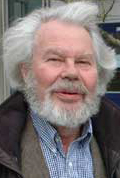 • Staffan Lindberg’s appointment as
Director extended for six months
• Staffan Lindberg’s appointment as
Director extended for six months
On Thursday 9 November, the vice-Chancellor
of Lund University also decided to extend the appointment of Prof.
Staffan Lindberg as Director/Coordinator of SASNET for
another six months, until 30 June 2007. The appointment of a new
Director/Coordinator after that, for the period up to 31 December
2009, has been postponed. The position was announced earlier this
year, and at its meeting on 29 August 2006, SASNET’s board
decided to recommend the Vice-Chancellor to appoint one of the appliocants,
Assistant Professor Anna Lindberg, Department of History, Penn State
University, USA. This recommendation remains.
 • SASNET
workshop in Stockholm focuses on academic exchange with South Asia
• SASNET
workshop in Stockholm focuses on academic exchange with South Asia
SASNET
holds a workshop on the "Role
of of South Asia in the Internationalisation of Higher Education in
Sweden" in
Stockholm 28-29 November 2006.
It is jointly organised by SASNET, Karolinska Institutet Medical University
and the Swedish Institute, and involves sessions with representatives
from 20 Swedish universities, and from the International Programme
Office for Education and Training; the Swedish National Agency for
Higher Education; STINT; the Government ministries of Education and
Foreign Affairs; and the South Asian embassies in Stockholm.
 The focus will be on experiences from masters and PhD programmes in
Sweden as well as in South Asia. The aim is to promote increased academic
exchange with South Asia. Since South Asia, and especially India, is
fastly becoming a major academic arena in the world, the workshop should
be of great interest to teachers involved in international student
exchange as well as administrators handling such exchanges at Swedish
universities. The conference will be inaugurated by Lars Leijonborg,
Minister of Education, Government of Sweden. Venue: Nobel Forum, Nobels
väg 1, Karolinska
Institutet, Solna. More information with the
full programme.
The focus will be on experiences from masters and PhD programmes in
Sweden as well as in South Asia. The aim is to promote increased academic
exchange with South Asia. Since South Asia, and especially India, is
fastly becoming a major academic arena in the world, the workshop should
be of great interest to teachers involved in international student
exchange as well as administrators handling such exchanges at Swedish
universities. The conference will be inaugurated by Lars Leijonborg,
Minister of Education, Government of Sweden. Venue: Nobel Forum, Nobels
väg 1, Karolinska
Institutet, Solna. More information with the
full programme.
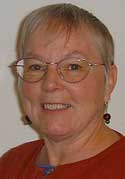 • SASNET
lecture about the Bhopal disaster 1984
• SASNET
lecture about the Bhopal disaster 1984
The physician Ingrid Eckerman
holds a SASNET lecture about the 1984 toxic disaster in Bhopal, in
Lund on Wednesday 15 November, 19.30.
It is titled ”The Bhopal Saga – causes and consequences
of the world’s largest industrial disaster”. The lecture
is organised in collaboration with the Association of Foreign Affairs
in Lund. In 1994 Dr. Eckerman was a member of the International Medical
Commission on Bhopal, and recently she wrote a book about the disaster
that took place at the Union Carbide factory in Bhopal in 1984. Venue:
Eden – room 131, Dept. of Polirical Science, Lund University,
Paradisgatan 5. More information.
• SASNET
lecture about the situation in Afghanistan
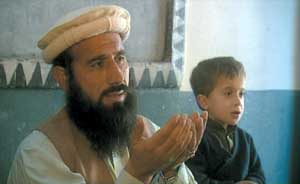 The Danish journalist Eva
Arnvig will hold a SASNET lecture aboiut ”Afghanistan:
Warlords, Taliban or who will rule in the future?” in Lund on
Wednesday 29 November 2006, 19.30. The event is organised in collaboration
with the the Association of Foreign Affairs at Lund University and
the Swedish Committee for Afghanistan (SCA). Eva Arnvig is not only
an experienced journalist but also a clinical psychologist. She has
worked for 18 years for UN organisationsa such as UNDP (United Nations
Development Programme), and has travelled extensively in Asia, not
the least in Afghanistan. Ms. Arnvig is presently working with training
senior journalists in Asia, but is also engaged in documentary film
productions about the problems in Iraq and Afghanistan. In 2002 she
received the Media Communications Association (MCA) Gold Award for
the documentary ”Children of Allah”, about everyday life
in the Haqqania madrassah in Pakistan (photo from the film above).
The Danish journalist Eva
Arnvig will hold a SASNET lecture aboiut ”Afghanistan:
Warlords, Taliban or who will rule in the future?” in Lund on
Wednesday 29 November 2006, 19.30. The event is organised in collaboration
with the the Association of Foreign Affairs at Lund University and
the Swedish Committee for Afghanistan (SCA). Eva Arnvig is not only
an experienced journalist but also a clinical psychologist. She has
worked for 18 years for UN organisationsa such as UNDP (United Nations
Development Programme), and has travelled extensively in Asia, not
the least in Afghanistan. Ms. Arnvig is presently working with training
senior journalists in Asia, but is also engaged in documentary film
productions about the problems in Iraq and Afghanistan. In 2002 she
received the Media Communications Association (MCA) Gold Award for
the documentary ”Children of Allah”, about everyday life
in the Haqqania madrassah in Pakistan (photo from the film above).
After the lecture, a discussion follows with Anders Davidson from SCA Lund. Venue:
Eden, rook 131, Paradisgatan 5, Lund. More
information.
• SASNET lecture about coalitional
politics in South Asia
Prof. K. C. Suri from Nagarjuna University in Andhra Pradesh, India,
holds a SASNET lecture in Lund on Wednesday 6 December 2006, 14.15 -
16.00. He will talk about "The Emergence of coalitional politics
in South Asia, with special reference to India". Prof. K.C. Suri
is a specialist on Indian and South Asian politics and also on agrarian
economic and political issues. In his lecture, organised by SASNET in
collaboration with the Development Studies Seminar at the Dept. of Sociology,
Lund University, he will also deal with nationalism and regionalism as
well as elite and mass attitudes towards democracy in India. Venue: Department
of Sociology, conference room 335, 2nd floor, Paradisgatan 5, Lund. More
information (as a pdf-file).
•
The Human Development Report 2006 launched on Thursday 9 November
2006
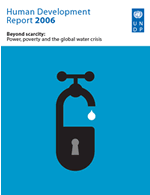 The 2006 Report is titled ”Beyond scarcity:
Power, poverty and the global water crisis”, and it was launched
in Cape Town, South Africa. A website with the Report and all related
material went live the same day, http://hdr.undp.org/hdr2006/.
The 2006 Report is titled ”Beyond scarcity:
Power, poverty and the global water crisis”, and it was launched
in Cape Town, South Africa. A website with the Report and all related
material went live the same day, http://hdr.undp.org/hdr2006/.
The yearly report commissioned by the United Nations Development
Programme (UNDP) offers a unique analysis, full of statistical data,
on the world’s
progress in meeting the ambitious Millennium Development Goals (ranging
from reversing and halting the spread of HIV/AIDS and other diseases
to achieving universal primary education, with an aim to lift hundreds
of millions of people out of extreme poverty by 2015), arising from the
Millennium Declaration which was endorsed by world leaders at the
UN Millennium Summit in September 2000. More
information.
As usual a comparative Human Development Index is
included in the report. In the HDR 2006, among the South Asian nations
Sri Lanka ranks highest (as nr 93 among a total number of 177 countries),
followed by Maldives (98). India ranks nr 126, Pakistan 134, Bhutan 135,
Bangladesh 137 and Nepal 138. Afghanistan is not included in the ranking.
Just like last year two Nordic countries top the list: Norway and Iceland.
Sweden is ranked as nr 5. The complete 2005 report is available on the
Internet. Go for the HDR Report
2006.
• Sida
grants to Swedish South Asia related research projects
On Friday 3 November
2006, Sida’s
(Swedish International Cooperation Development Agency) so-called U-landsforskningsråd
decided upon the 2006 grants applications. At least 11 of
the projects that will get funding for the coming years (2007-09) deal
with South Asia related research. Among the most successful applicants
are Anna Godhe, Marine Botany, Department
of Marine Ecology, Göteborg University, who receives
SEK 2.3 million for a project titled ”Interrelation between
bacteria and phytoplankton blooms in the Arabian Sea”; Christer
Norström
(photo to the right), Dept. of Social
Anthropology, Stockholm University, who receives SEK 2.1 million
for a project titled ”Food as a metaphor for the past and
the future among farmers in South India: the perception of food and
food production in a fast changing world; and Kristine Höglund, Dept.
of Peace and Conflict Research, Uppsala University, who receives
SEK 2.0 million for a project titled ”Peacemaking and Aid
in Developing Countries: Nordic Involvement in Sri Lanka”; Go
for SASNET’s list of South Asia related projects funded by Sida/SAREC
2006.
• Swedish
Research Links grants to 11 South Asia related projects
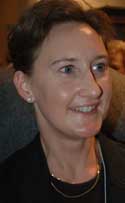 Swedish
Research Links grants for the period 2007-09 were decided upon for a large
number of Asia related research projects in late October 2006.
Sida and the Swedish Research Council initiated the Swedish Research
Links programmes in 2002, and within this framework the Asian–Swedish
Research partnership programme specifically aims to stimulate
contacts between Swedish researchers and researchers in Asia. Ten of
the approved projects directly relate to South Asia, including three
project from Karolinska Institutet Medical University, Stockholm (applications
from Vinod Diwan, Cecilia Stålsby Lundborg (photo to the
left) and Sanjeevi Carani respectively). Prof. Sheila Kirkwood
at the Swedish Institute of Space Physics in Kiruna also got a grant
for a collaboration project with the National Atmospheric Research
Laboratory (NARL) in India. Go for
SASNET’s list of South Asia related projects given Swedish Research
Links grants 2006
Swedish
Research Links grants for the period 2007-09 were decided upon for a large
number of Asia related research projects in late October 2006.
Sida and the Swedish Research Council initiated the Swedish Research
Links programmes in 2002, and within this framework the Asian–Swedish
Research partnership programme specifically aims to stimulate
contacts between Swedish researchers and researchers in Asia. Ten of
the approved projects directly relate to South Asia, including three
project from Karolinska Institutet Medical University, Stockholm (applications
from Vinod Diwan, Cecilia Stålsby Lundborg (photo to the
left) and Sanjeevi Carani respectively). Prof. Sheila Kirkwood
at the Swedish Institute of Space Physics in Kiruna also got a grant
for a collaboration project with the National Atmospheric Research
Laboratory (NARL) in India. Go for
SASNET’s list of South Asia related projects given Swedish Research
Links grants 2006
• Riksbankens Jubileumsfond
funds anthropological project about India’s superpower role
On 26 October
2006, Riksbankens Jubileumsfond (Bank of Sweden Tercentenary Foundation)
decided upon its 2006 grants.
Among the 40 successful applications for research projects one
is related to South Asia, namely Dr. Per Ståhlberg from the Dept.
of Social Anthropology, Stockholm University, who was given SEK
1.79 million as a grant for a project titled ”India as a
Global Superpower; An Anthropological Study of Future Visions".
The Bank of Sweden Tercentenary Foundation also
gave major grants to infrastructural ventures projects. One of the
main recipients for such a grant was Professor Peter Wallensteen, Dept.
of Peace and Conflict Research, Uppsala University, who was given
SEK 3.8 million for a project titled ”The World’s Wars – the
World’s Peace. A Global Portal”.
•
Stockholm seminar being planned for Nobel peace prize winner
 The Norwegian
Nobel Committee has decided to award the Nobel Peace Prize for 2006,
divided into two equal parts, to Bangladesh’s
Muhammad Yunus and the Grameen
Bank, for
their efforts to create economic and social development from below.
Lasting peace can not be achieved unless large population groups
find ways in which to break out of poverty. Micro-credit is one such
means. Development from below also serves to advance democracy and
human rights. Muhammad Yunus, formerly professor of Economics at
Chittagong University, founded the bank in 1976. It has become a
pioneer of micro-credit lending schemes for the poor in Bangladesh,
especially women, so that they can launch their own businesses. The
winners receive a prize of 10m Swedish kronor. The award ceremony
will take place in Oslo on Sunday 10 December 2006. While in Scandinavia,
Prof. Yunus will also make a visit to Sweden, that will include an
academic seminar in Stockholm on Wednesday
13 December. The seminar will be organised by Stockholm
Institute of Transition Economics (SITE) at Stockholm School
of Business. More
information about Dr. Yunus’ award.
The Norwegian
Nobel Committee has decided to award the Nobel Peace Prize for 2006,
divided into two equal parts, to Bangladesh’s
Muhammad Yunus and the Grameen
Bank, for
their efforts to create economic and social development from below.
Lasting peace can not be achieved unless large population groups
find ways in which to break out of poverty. Micro-credit is one such
means. Development from below also serves to advance democracy and
human rights. Muhammad Yunus, formerly professor of Economics at
Chittagong University, founded the bank in 1976. It has become a
pioneer of micro-credit lending schemes for the poor in Bangladesh,
especially women, so that they can launch their own businesses. The
winners receive a prize of 10m Swedish kronor. The award ceremony
will take place in Oslo on Sunday 10 December 2006. While in Scandinavia,
Prof. Yunus will also make a visit to Sweden, that will include an
academic seminar in Stockholm on Wednesday
13 December. The seminar will be organised by Stockholm
Institute of Transition Economics (SITE) at Stockholm School
of Business. More
information about Dr. Yunus’ award.
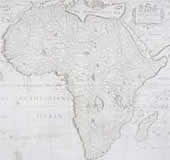 • Perspectives
on Development Cooperation applicable also on South Asia
• Perspectives
on Development Cooperation applicable also on South Asia
In
order to fill a gap for teaching materials with special relevance to
Swedish and European development policy studies, the Centre
for African studies (CAS), School of Global Studies at Göteborg
university, has started to produce a series of smaller publications
called “Perspectives on Development Cooperation in Africa”.
CAS launched a master programme (“bredd-magister”) on African
Studies with special emphasises on international development cooperation
last year, and from 2007/08 it will – as part of the Bologna
process – be developed into a regular masters programme (as a
track within the joint masters programme in regional studies, planned
for by the School of Global Studies).
The
lack of relevant teaching material has however become evident,
and therefore good essays and reports by previous masters students
at CAS, as well as more in depth original material within the
field of development studies, will now be made accessible and
published electronically in this Perspectives series. The initiative
comes from Lennart Wohlgemut, guest
professor at CAS. During 2006 he has written the first four reports
in the series, namely: ”Svensk
biståndspolitik i ett internationellt perspektiv” (Swedish
developmental assistance policy in an International perspective,
written in Swedish together with Bertil Odén); ”Changing
Aid Modalities in Tanzania”; ”Humanitarian
Assistance”; and ”Swedish and EU Africa
Policy”. Even though the reports naturally focus on
Africa they are also in many ways relevant for South Asian developmental
studies.
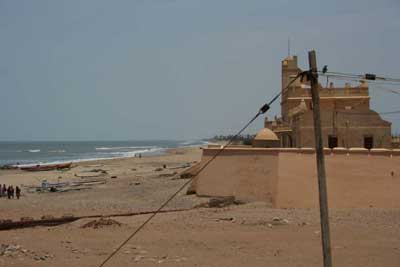 • Lots
of Danish research projects focused
on Tranquebar
• Lots
of Danish research projects focused
on Tranquebar
A large number of
Danish researchers are involved in projects during the maritime Galathea
3 expedition by ship around the World.
One part of the Galathea 3 expedition consists of the so-called Tranquebar
Initiative of the National Museum of Denmark, where Danish and Indian
researchers carry out projects related to Tranquebar on the Tamil Nadu
coast, a town that was a Danish colony upto 1845. Other projects relate
to Serampore in West Bengal, and the Nicobar Islands, other places
that have had a strong Danish connection. More
information about Galathea 3 and all the Indian projects involved.
• Indo-Dutch
Programme on Alternatives in Development draws to an end
 After 25 years
of enriching research on alternatives in development the IDPAD (Indo-Dutch
Programme on Alternatives in Development) programme is coming to an
end in December 2006. A so-called IDPAD End Symposium
was held 1–3 November 2006 in Hyderabad, with the theme ”India’s
Development: Even or Uneven? Reflections on development theory and
practice”
(more
information about the Hyderabad seminar), and a similar symposium
will be held in The Hague, Netherlands, on Friday 24 November (more
information about the Hague symposium). The keynote speakers in the
latter include Prof. Dipankar Gupta, Jawaharlal Nehru University, New
Delhi; and Prof. Carla Risseeuw, Leiden University. IDPAD grew out of
intensifying contacts and co-operation between Indian and Dutch social
scientists, inspired by the need to explore 'alternatives in development'.
The programme was formally launched in 1980. IDPAD's main activities
have been the promotion and funding of research projects, seminars and
exchange visits. It has been jointly implemented by the Indian
Council of Social Science Research (ICSSR) in New Delhi, and The
Netherlands Foundation for the Advancement of Tropical Research (WOTRO)
in The Hague. More information about
IDPAD.
After 25 years
of enriching research on alternatives in development the IDPAD (Indo-Dutch
Programme on Alternatives in Development) programme is coming to an
end in December 2006. A so-called IDPAD End Symposium
was held 1–3 November 2006 in Hyderabad, with the theme ”India’s
Development: Even or Uneven? Reflections on development theory and
practice”
(more
information about the Hyderabad seminar), and a similar symposium
will be held in The Hague, Netherlands, on Friday 24 November (more
information about the Hague symposium). The keynote speakers in the
latter include Prof. Dipankar Gupta, Jawaharlal Nehru University, New
Delhi; and Prof. Carla Risseeuw, Leiden University. IDPAD grew out of
intensifying contacts and co-operation between Indian and Dutch social
scientists, inspired by the need to explore 'alternatives in development'.
The programme was formally launched in 1980. IDPAD's main activities
have been the promotion and funding of research projects, seminars and
exchange visits. It has been jointly implemented by the Indian
Council of Social Science Research (ICSSR) in New Delhi, and The
Netherlands Foundation for the Advancement of Tropical Research (WOTRO)
in The Hague. More information about
IDPAD.
• New
Swedish Agency for Development Evaluation inaugurated in Karlstad
 The
Agency for Development Evaluation, SADEV, focused on developemt education
and headquartered in Karlstad, started its work
on 1 January 2006. SADEV is a Swedish government-funded institute that
carries out and disseminates expert analyses and evaluations of international
development cooperation. The overarching objective is to contribute
to increased efficiency in Swedish development cooperation. On Wednesday
8 November 2006, SADEV was formally inaugurated with a day full of
seminars. Lecturers such as Axel Hadenius, Göran Djurfeldt, Rolf
Sandahl, and Arne Bigsten talked about about democratization, the global
food situation, role of evaluation in development cooperation, and
aid and development in Africa. Full
programme at SADEV’s web page.
The
Agency for Development Evaluation, SADEV, focused on developemt education
and headquartered in Karlstad, started its work
on 1 January 2006. SADEV is a Swedish government-funded institute that
carries out and disseminates expert analyses and evaluations of international
development cooperation. The overarching objective is to contribute
to increased efficiency in Swedish development cooperation. On Wednesday
8 November 2006, SADEV was formally inaugurated with a day full of
seminars. Lecturers such as Axel Hadenius, Göran Djurfeldt, Rolf
Sandahl, and Arne Bigsten talked about about democratization, the global
food situation, role of evaluation in development cooperation, and
aid and development in Africa. Full
programme at SADEV’s web page.
• Sasnet Fermented Foods
network organised Copenhagen seminar with Indian scientists
The European Commission funded research
network ”Sasnet
Fermented Foods” organised
a one-day seminar about the potential of fermented foods of South Asia,
in Copenhagen on Monday 23 October 2006. The seminar was titled “Fermented
foods, health status, and wellbeing”, and was jointly organised
by the Øresund Food Network and Sasnet Fermented Foods
– an initiative originally grown out of a SASNET planning
grant, and cordinated by Prof. Baboo Nair, Dept.
of Applied Nutrition and Food Chemistry, Lund Institute of
Technology, Lund University. During the seminar, scientists from
India, coming from prominent institutions of food and dairy research
in the country, presented examples of modern food research on fermented
foods being conducted in India. Special attention was paid to health
promoting foods. Read a report
from the seminar.
• NIAS offers scholarships
three times a year
The Nordic Institute for Asian Studies (NIAS) offers
scholarships for visiting Nordic MA students and PhD candidates to
its research centre and library in Copenhagen,
through the so called NIAS SUPRA programme (Support
Programme for Asian Studies). Students affiliated with institutions
that are members of the Nordic NIAS Council (see www.nias.ku.dk)
are offered full scholarships that cover travel expenses, accommodation
and full board at the ”Nordisk
Kollegium”, whereas students from non-members of Nordic NIAS
Council will have to pay for accommodation and transportation themselves.
For students from Lund University there is also an alternative, namely Öresund
Scholarships. In this case NIAS reimburses daily commuting costs to/from
Copenhagen. Application deadlines for SUPRA scholarships are three
times a year. Application deadline for scholarships during January-March
2007 is 1 December 2006. More
information.
• European
Union organisesa Asia-Link Symposium in New Delhi
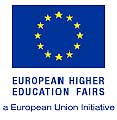 For the first time
ever, more than 100 recognized European Higher Education Institutions
from more than 25 European Countries gather in New Delhi for
the European Higher Education Fair from 24 to 26 November 2006. The
European Union has taken the initiative to provide an opportunity to
the Indian students, to get a close and direct insight into the high
quality and diversity of the European Higher Education and Research
and to get to know Europe better. The Asia-Link Symposium will focus
on the theme "Academic cooperation and student mobility between
India and Europe", setting the platform for high level international
dialogue between high ranking Indian and European officials and relevant
stakeholders. The discussions will be on sharing experiences on the
relevance of the Bologna Process to India, on strengthening the India-EU
academic/institutional collaboration including Joint Study Programmes. More
information.
For the first time
ever, more than 100 recognized European Higher Education Institutions
from more than 25 European Countries gather in New Delhi for
the European Higher Education Fair from 24 to 26 November 2006. The
European Union has taken the initiative to provide an opportunity to
the Indian students, to get a close and direct insight into the high
quality and diversity of the European Higher Education and Research
and to get to know Europe better. The Asia-Link Symposium will focus
on the theme "Academic cooperation and student mobility between
India and Europe", setting the platform for high level international
dialogue between high ranking Indian and European officials and relevant
stakeholders. The discussions will be on sharing experiences on the
relevance of the Bologna Process to India, on strengthening the India-EU
academic/institutional collaboration including Joint Study Programmes. More
information.
• First ever ranking of universities
in Pakistan
As a means of increasing the standard of higher education
in Pakistan the Higher Education Commission (HEC) has developed the
country’s
first ever ‘Ranking of
Universities’.
The primary purpose of the ranking exercise is to share with the General
Public comprehensive data on the key issues that determine the state
of higher education in a particular institution. The rankings are based
on data collected on the following key issues with relative weightages
for each provided respectively: Students (17%), Facilities (15%), Finances
(15%), Faculty (27%) and Research (26%). More
information
• 12th Himalayan Languages Symposium
to be held in Kathmandu
The 12th Himalayan Languages Symposium (and
the 27th Conference of Linguistic Society of Nepal) will be held in
Kathmandu, 26–28
November 2006. The Himalayan Languages Symposium
brings together scholars working on languages and language communities
of the greater Himalayan region: Nepal, north-western and north-eastern
India, Bhutan, northern Burma, Tibet, southern China, and Nuristan,
Baltistan and Burusaski-speaking area in the west. Keynote speeches
will be given by Dr. Anju Saxena, Dept.
of Linguistics and Philology, Uppsala University; and Prof.
Tony McEnery, Director for the British Research Council in UK. More
information (as a pdf-file).
• International workshop on Medical
Geology in Dhaka
An international workshop on ”Medical Geology:
Metals, Health and Environment” is held in Dhaka, Bangladesh,
27–30 November 2006. It is jointly organized by the Dept. of
Geology, Dhaka University; the Dept. of Occupational & Environmental
Health, National Institute of Preventive and Social Medicine (NIPSOM),
Dhaka; Dept. of Environmental Science, Stamford University, Dhaka;
and Royal Institute of Technology, Stockholm, Sweden. The scope of
the workshop is to share the most recent information on the relationship
between impacts of toxic metal ions, trace elements and their impact
on the environmental and public health issues. Dr. Prosun Bhattacharya
from the Dept. of Land and Water Resources
Engineering, Royal Institute of Technology, Stockholm and Dr. Olle
Selinus from the Geological Survey of Sweden, are among the overseas
resource persons invited for the workshop, that will be hosted by Stamford
University. More information (as a pdf-file)
• Uppsala
conference on anthropological methods in Swedish development cooperation
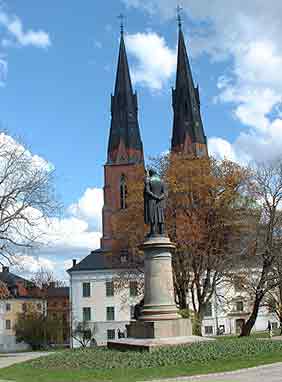 A
conference titled ”Anthropology
in Practice Theory, Method and Ethnography in Swedish Development Cooperation” is
held in Uppsala 30
November – 2 December 2006. It is organised by the Dept.
of Cultural Anthropology & Ethnology, Uppsala University with
funds provided by Sida’s Department for Policy and Methodology.
Three plenary lectures are included in the programme, by Jean-Pierre
Olivier de Sardan, Ecole des Hautes Etudes en Sciences Sociales, Marseille;
David Lewis, London Schools of Economics; and Rosalind Eyben, University
of Sussex. Five workshops dealing with anthropological methods and
developement policies are also held.
A
conference titled ”Anthropology
in Practice Theory, Method and Ethnography in Swedish Development Cooperation” is
held in Uppsala 30
November – 2 December 2006. It is organised by the Dept.
of Cultural Anthropology & Ethnology, Uppsala University with
funds provided by Sida’s Department for Policy and Methodology.
Three plenary lectures are included in the programme, by Jean-Pierre
Olivier de Sardan, Ecole des Hautes Etudes en Sciences Sociales, Marseille;
David Lewis, London Schools of Economics; and Rosalind Eyben, University
of Sussex. Five workshops dealing with anthropological methods and
developement policies are also held.
A few researchers working with South Asia related projects will participate,
for example Seema Arora-Jonsson, Dept. of Urban
and Rural Development, Swedish University of Agricultural Sciences,
will discuss ”Comparing National and International Contexts:
Environmental and Gender Policy and Practice”; and Malin Arvidsson, Dept.
of Sociology, Lund University about
”Professional Altruist: Contradictions and Confusion in Development
Work”. Venue: Uppsala University main building, room IV.
• New Delhi seminar on emerging health
challenges
An international seminar on ”Emerging
health challenges and the response of Indian healthcare system. Where
is the Indian healthcare system going?” is held in New Delhi, India,
4–5
December 2006. It is jointly organised by Centre
de Sciences Humaines, Delhi and the Dept. of Geography at Delhi
School of Economics. European scholars have been invited for this
two-day seminar, with an aim at creating a common platform to share
results, experiences and methods with Indian scholars. The seminar
is also open to non-academics, as health is an issue of general interest
where much can be learnt from professionals and actors involved in
the Indian healthcare system. Venue: Delhi School of Economics, Delhi
University. More
information (as a pdf-file)
• SPIDER
workshop in Jönköping
 A workshop titled "Empowering people
through ICT for sustainable development" will be held in Jönköping 6–7
December 2006. It is jointly organised by SPIDER (Swedish
Program for Information and Communication Technology, ICT, in Developing
Regions) and Jönköping University. The aim of the workshop
is to strengthen SPIDER's ongoing work of bringing together Swedish
ICT expertise and to inspire our future direction. Participants from
partner universities, organizations as well as the private and public
sectors will meet and discuss the opportunities of ICT4D in areas such
as e-health, e-governance, education and environment. Democracy, human
rights and social development will also be part of the agenda.
A workshop titled "Empowering people
through ICT for sustainable development" will be held in Jönköping 6–7
December 2006. It is jointly organised by SPIDER (Swedish
Program for Information and Communication Technology, ICT, in Developing
Regions) and Jönköping University. The aim of the workshop
is to strengthen SPIDER's ongoing work of bringing together Swedish
ICT expertise and to inspire our future direction. Participants from
partner universities, organizations as well as the private and public
sectors will meet and discuss the opportunities of ICT4D in areas such
as e-health, e-governance, education and environment. Democracy, human
rights and social development will also be part of the agenda.
• Chemistry in the 21st Century theme
for Dhaka conference
The International Bangladesh Chemical Congress
2006 is held in Dhaka 7–10
December 2006. It is also the 29th
Annual Conference of Bangladesh Chemical Society (BCS), and the theme
for the 2006 conference will be
”Chemistry in the 21st Century”. It is funded by the International
Foundation for Science (IFS) based in Stockholm. Every alternate
CBS conference is held on an international level and these are attended
by a good number of eminent scientists from different parts of the world.
The Bangladesh Chemical Congress 2004 was attended by over 600 participants
including 35 foreign scientists. Venue: Sangsad Bhaban (Parliament House),
Dhaka.
• New Delhi workshop on Water, Law and
the Commons
A workshop entitled ”Water,
Law and the Commons”
will be held in New Delhi 8–10 December 2006. It is organised
by the International Environmental Law Research Centre (IELRC), based
in Geneva, Switzerland. IELRC is currently implementing a 3-year research
project entitled 'Legal Issues Related to Water Sector Restructuring:
Human Rights, Environment, Agriculture and Socio-Economic Aspects', and
the workshop is part of this project. Papers are invited from all academics,
policy makers and activists working across the spectrum of water law;
water resources conservation; and water and environment related issues. More
information.
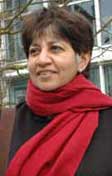 • Swedish Gender and Development Network
organises conference in New Delhi
• Swedish Gender and Development Network
organises conference in New Delhi
The
Swedish research network GADNET, Gender
and Development Network, organises a Global conference on
”A World in Transition – New Challenges for Gender
Justice” in New Delhi, India, 13–15 December
2006. It is organised in collaboration with the Centre
for Women’s Development Studies (CWDS) in New Delhi.
Keynote speakers include Dr. Vina Mazumdar, Founder of the Centre
for Women’s Development Studies, New Delhi; Prof. Jayati
Ghosh, Centre for Economic Studies and Planning, Jawaharlal Nehru
University, New Delhi; and Dr. Tejaswini Niranjana (photo to
the right), Director, Centre for Study the Study of Culture
and Society, Bangalore. The conference is only open for GADNET
members and by CWDS invited researchers.
• Leiden
seminar about ancient Sanskrit books manuscripts
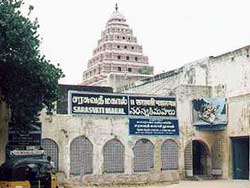 A seminar about ”Production,
distribution and collection of Sanskrit manuscripts in Ancient South
India” is
held in Leiden,
the Netherlands, 19–21 April 2007. The seminar is organised by
the International Institute for Asian Studies (IIAS) in collaboration
with the Katholieke Universiteit Leuven in Belgium. The aim of the
seminar is to study the production, distribution and collection of
Sanskrit manuscripts in ancient South India in order to get a better
picture of the history of currently available manuscripts such as those
in the enormous collections of the Sarasvati
Mahal library (photo above) in Tanjavur; of the Adyar
Library and the Government Oriental Manuscripts library in Chennai;
but also those in collections outside India, for instance, the Van
Manen collection of palm leaf manuscripts of the Kern Institute, Leiden. More
information.
A seminar about ”Production,
distribution and collection of Sanskrit manuscripts in Ancient South
India” is
held in Leiden,
the Netherlands, 19–21 April 2007. The seminar is organised by
the International Institute for Asian Studies (IIAS) in collaboration
with the Katholieke Universiteit Leuven in Belgium. The aim of the
seminar is to study the production, distribution and collection of
Sanskrit manuscripts in ancient South India in order to get a better
picture of the history of currently available manuscripts such as those
in the enormous collections of the Sarasvati
Mahal library (photo above) in Tanjavur; of the Adyar
Library and the Government Oriental Manuscripts library in Chennai;
but also those in collections outside India, for instance, the Van
Manen collection of palm leaf manuscripts of the Kern Institute, Leiden. More
information.
• NCI
conference will be held in the Fall 2007
 The Nordic Centre in India
(NCI) consortium organises a conference titled "The
Global University. International collaboration in research and higher
education”, in New Delhi, India, sometime during September-October
2007. It will focus on India and the new trends in international exchange
pertaining to research and higher education. The conference is organised
by the Nordic Centre in India, NCI,
a consortium of leading universities and research institutions in Finland,
Norway, Denmark and Sweden. The first part of the conference will focus
on main trends in globalized knowledge production and exchange, whereas
the second part will focus more specifically on Indo-Nordic university
exchanges. The conference will also offer a variety of specially designed
seminars, business meetings and study visits. Venue: India International
Centre, Lodi Estate, New Delhi. More
information.
The Nordic Centre in India
(NCI) consortium organises a conference titled "The
Global University. International collaboration in research and higher
education”, in New Delhi, India, sometime during September-October
2007. It will focus on India and the new trends in international exchange
pertaining to research and higher education. The conference is organised
by the Nordic Centre in India, NCI,
a consortium of leading universities and research institutions in Finland,
Norway, Denmark and Sweden. The first part of the conference will focus
on main trends in globalized knowledge production and exchange, whereas
the second part will focus more specifically on Indo-Nordic university
exchanges. The conference will also offer a variety of specially designed
seminars, business meetings and study visits. Venue: India International
Centre, Lodi Estate, New Delhi. More
information.
• Other conferences connected to South Asian
studies arranged all over the World
See SASNET’s page, http://www.sasnet.lu.se/conferences.html#conf
Important lectures and workshops
• Oslo lecture by Padmanabh
Jaini
Professor emeritus
Padmanabh Jaini from University of California Berkeley, holds a guest
lecture about war and Buddhist ideology in Sri Lanka, at Oslo
University on Friday 10 November 2006, 14.15. The lecture is titled ”In
Defense of the Arhats”.
Professor Jaini is a scholar of Jainism and Buddhism, having taught
at the Banaras Hindu University, the School of Oriental and African
Studies, the University of Michigan at Ann Arbor and at the University
of California at Berkeley, from where he retired in 1994. Venue: Institute
of Cultural Studies and Oriental Languages (IKOS), room 116 PAM,
University of Oslo, Blindern.
• Copenhagen lecture about Religion,
Politics and Holy Shrines in Pakistan
Uzma Rehman will lecture about ”Religion, Politics and
Holy Shrines in Pakistan”
in Copenhagen on Tuesday 14 November 2006, 15.15. The seminar is organised
by the Dept. of Cross-Cultural and Regional Studies, University of Copenhagen.
Venue: Snorres gade 17-19, first floor, hall U8, Copenhagen.
• Uppsala research seminar with Dr.
Raj Sekhar Basu from Kolkata
A research seminar titled ”Reinterpreting
Dalit Movements in India” is held with Dr. Raj Sekhar Basu
from the University of Calcutta, India, at Uppsala University
on Thursday 16 November 2006, 10.00–12.00. It is organised by
the Seminar for Development Studies (SDS) and the South Asia Seminar
(SAS) at Uppsala University. Dr. Eva Maria Hardtman, Researcher at
the Dept.
of Social Anthropology, Stockholm University, will be the discussant
with the historian Dr. Basu, who has written about issues of caste,
religion and colonialism in an Indian context. The seminar will present
some of his recent research concerning the complexities of the Dalit
Movements in colonial and post-colonial India. Venue: Engelska Parken,
Thunbergsv. 3A, Room 1-1042, Uppsala University. More
information.
• Anna Valve lectures in Lund about
the Sri Lanka Monitoring Mission
Anna Valve, administrator at the Unit
for Global Security, Swedish Ministry of Foreign Affairs, will lecture
in Lund about ”The
Nordic involvement in the Sri Lanka Monitoring Mission, and the Peace
Process in Sri Lanka” on Thursday 30 November 2006, 13.15. The
lecture is organised by the Division of Peace and Conflict Research,
Dept. of Political Science, Lund University. Venue: Room 233, Eden,
Paradisgatan 5. More
information.
• Suri lectures in Copenhagen
about challenges to Indian democracy
Prof. K. C. Suri from Nagarjuna University in Andhra Pradesh, India,
participates
in a NIAS roundtable discussion in Copenhagen on Thursday 7 December
2006. It takes place between 12.00 and 13.30. It will be a presentation
on "Agrarian
Distress and Maoist Armed Struggle: Two Challenges to Indian Democracy".
During the talk light refreshments will be provided by NIAS. The Institute
is located at Leifsgade 33, Copenhagen. If you wish to participate in
this event, you should contact NIAS Information & Seminar Coordinator
Erik Skaaning as soon as possible.
 • The
2006 Right Livelihood Award laureate Ruth Manorama from India participates
in a seminar in Uppsala on Thursday 7 December,
at 19.00, along with the other two recipients of the 2006 Right Livelihood
Award: Chico Whitaker (Brazil) and Daniel Ellsberg (USA). This seminar
is arranged by the Uppsala Association of International Affairs in
collaboration with the Dag Hammarskjöld Foundation and the Centre
for Environment and Development Studies (Cemus) at Uppsala University.
Venue: Vasasalen, Uppsala slott, entrance from the southern tower.
• The
2006 Right Livelihood Award laureate Ruth Manorama from India participates
in a seminar in Uppsala on Thursday 7 December,
at 19.00, along with the other two recipients of the 2006 Right Livelihood
Award: Chico Whitaker (Brazil) and Daniel Ellsberg (USA). This seminar
is arranged by the Uppsala Association of International Affairs in
collaboration with the Dag Hammarskjöld Foundation and the Centre
for Environment and Development Studies (Cemus) at Uppsala University.
Venue: Vasasalen, Uppsala slott, entrance from the southern tower.
• Copenhagen lecture about honour killings
in Pakistan
Rubya Mehdi will lecture about ”Islamic
Law of Murder in Relation to Honour-Killing: Case of Pakistan” in
Copenhagen on
Tuesday 12 December 2006, 15.15. The seminar is organised by the Dept.
of Cross-Cultural and Regional Studies, University of Copenhagen. Venue:
Snorres gade 17-19, first floor, hall U8, Copenhagen.
South Asia related culture in Scandinavia
• Lund Cricket Club entertains with
Tagore songs
Lund Cricket Club organises a party with cultural programme
on Saturday 11 November 2006, 15.30–22.30. The programme
includes live Indian music performed by the Rabindrasangheet singer
Bubu Munshi Eklund singing Tagore songs and bhajans. There will also
be a chance to enjoy the traditional Indian dance of Dandia. Venue:
Gemenskapslokal, Trollebergsvägen 9, Lund. More
information (as
a pdf-file)
•
Saraswathy Kalakendra invites to Salangai Pooja in Huddinge
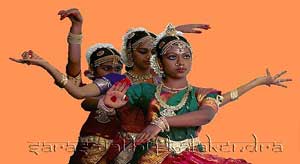 Saraswathy Kalakendra Institution
of Fine Arts in Huddinge invites to a celebration of Salangai Pooja
on Saturday 18 November 2006, 16–19. The
Bharata Natyam dance school was started in 2004 by Usha Balasundaram,
originally from Kerala and trained at the famous dance institution
Kalakshetra College of Fine Arts in Chennai, India. Currently the
school has 60 students of Indian, Sri Lankan, Bangladeshi, Swedish,
Russian, Polish and Brazilian origin. Performances have been frequent
during the past two years in the Stockholm region. Venue: Teater
Slava, Tonsalen Kyrkogårds vägen 2, Huddinge. More
information.
Saraswathy Kalakendra Institution
of Fine Arts in Huddinge invites to a celebration of Salangai Pooja
on Saturday 18 November 2006, 16–19. The
Bharata Natyam dance school was started in 2004 by Usha Balasundaram,
originally from Kerala and trained at the famous dance institution
Kalakshetra College of Fine Arts in Chennai, India. Currently the
school has 60 students of Indian, Sri Lankan, Bangladeshi, Swedish,
Russian, Polish and Brazilian origin. Performances have been frequent
during the past two years in the Stockholm region. Venue: Teater
Slava, Tonsalen Kyrkogårds vägen 2, Huddinge. More
information.
• Stockholm
concert with Hariprasad Chaurasia
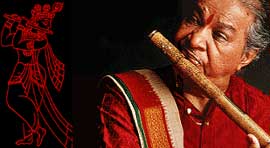 The Internationally renowned flute
player Hariprasad Chaurasia performs in Stockholm on Wednesday 22 November
2006, 19.00.
Venue: Grünewaldsalen, Konserthuset, Hötorget, Stockholm
(entrance from Kungsgatan 43). Chaurasia will be accompanied by Bhavani
Shankar (pakhavaj), Vijay Ghate (tabla), Sunil Avachat (flute), and
Pushpanjali Chaurasia (tanpura). The concert is arranged by Svensk-Indiska
Föreningen
in collaboration with the Embassy of India in Sweden and the Indian
Council for Cultural Relations. More information (as
a pdf-file)
The Internationally renowned flute
player Hariprasad Chaurasia performs in Stockholm on Wednesday 22 November
2006, 19.00.
Venue: Grünewaldsalen, Konserthuset, Hötorget, Stockholm
(entrance from Kungsgatan 43). Chaurasia will be accompanied by Bhavani
Shankar (pakhavaj), Vijay Ghate (tabla), Sunil Avachat (flute), and
Pushpanjali Chaurasia (tanpura). The concert is arranged by Svensk-Indiska
Föreningen
in collaboration with the Embassy of India in Sweden and the Indian
Council for Cultural Relations. More information (as
a pdf-file)
• Documentary
films about India shown during Lund film seminar
 The Centre for East
and South-East Asian Studies (ACE) at Lund University arranges a documentary
film festival on the theme ”Youth
in Asia”,
22-23 November 2006. Two films about India are included in the programme, ”FLYOVERDELHI” directed
by the anthropologist Paolo Favero, Dept.
of Social Anthropology, Stockholm University; and ”Highway
Courtesans” directed by the independent filmmaker Mystelle
Brabbee, USA (photo from the film). As there are only a limited
number of seats available it is necessary to ask for tickets (free
of charge) well in advance, by sending a mail
to Nina Brand. Venue: Kino, Kyrkogatan, Lund. Information about
the films and the preliminary programme is found on http://www.ace.lu.se/o.o.i.s/6923.
The Centre for East
and South-East Asian Studies (ACE) at Lund University arranges a documentary
film festival on the theme ”Youth
in Asia”,
22-23 November 2006. Two films about India are included in the programme, ”FLYOVERDELHI” directed
by the anthropologist Paolo Favero, Dept.
of Social Anthropology, Stockholm University; and ”Highway
Courtesans” directed by the independent filmmaker Mystelle
Brabbee, USA (photo from the film). As there are only a limited
number of seats available it is necessary to ask for tickets (free
of charge) well in advance, by sending a mail
to Nina Brand. Venue: Kino, Kyrkogatan, Lund. Information about
the films and the preliminary programme is found on http://www.ace.lu.se/o.o.i.s/6923.
New and updated items on SASNET web site
• Swedish departments where research
on South Asia is going on:
Constantly added to the list of research environments at Swedish
universities, presented by SASNET. The full list now includes 192 departments,
with detailed descriptions of the South Asia related research and education
taking place! Go
to http://www.sasnet.lu.se/environment.html
• Several new articles recommended for reading
Look at http://www.sasnet.lu.se/recreading.html
for suggestions on interesting new articles on South Asia in International
media.
• Useful travelling information
Look at http://www.sasnet.lu.se/travelling.html.
Updated travel advises from the The British Foreign & Commonwealth
Office about safety aspects on travelling to the countries of South Asia.
Also new links to Kolkatabirds.com,
an extensive ornithologists web site, presenting more than 950 species of Indian
birds with colour photos; and Tea
Centre in Stockholm, offering tea from Bangladesh, India and Sri Lanka
(and other countries).
Best regards,
Staffan Lindberg Lars Eklund
SASNET/ Swedish South Asian Studies Network
SASNET is a national network
for research, education, and information about South Asia, based at Lund
University. The aim is to encourage and promote an open and dynamic networking
process, in which Swedish researchers co-operate with researchers in South
Asia and globally.
The network is open to all sciences. Priority is given to co-operation
between disciplines and across faculties, as well as institutions in the
Nordic countries and in South Asia. The basic idea is that South Asian
studies will be most fruitfully pursued in co-operation between researchers,
working in different institutions with a solid base in their mother disciplines.
The network is financed by Sida (Swedish
International Development Cooperation Agency) and by Lund
University.
Postal address: SASNET – Swedish South Asian Studies Network,
Scheelevägen 15 D, S-223 70 Lund, Sweden
Visiting address: Ideon Research Park, House Alfa 1 (first floor,
room no. 2040), in the premises of the Centre for East and South East
Asian Studies at Lund University (ACE).
Phone: + 46 46 222 73 40
Fax: + 46 46 222 30 41
E-mail: sasnet@sasnet.lu.se
Web site:
http://www.sasnet.lu.se
Staff: Staffan
Lindberg, director/coordinator & Lars
Eklund, webmaster/deputy director
SASNET - Swedish South Asian Studies Network/Lund
University
Address: Scheelevägen 15 D, SE-223 70 Lund, Sweden
Phone: +46 46 222 73 40
Webmaster: Lars Eklund
Last updated
2010-03-30